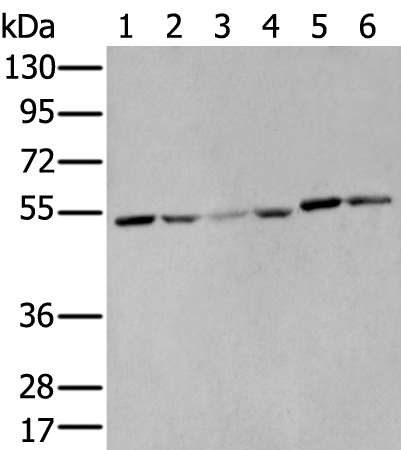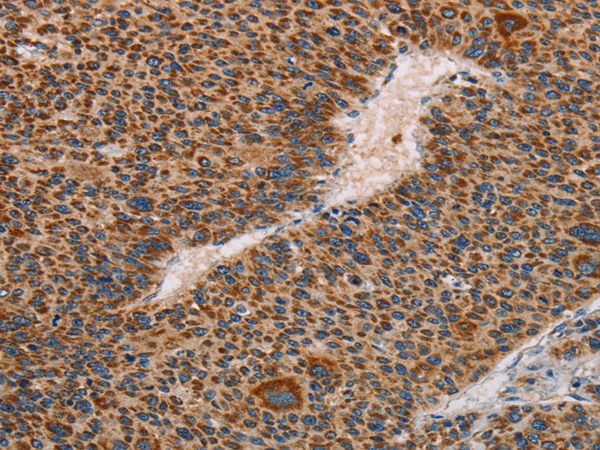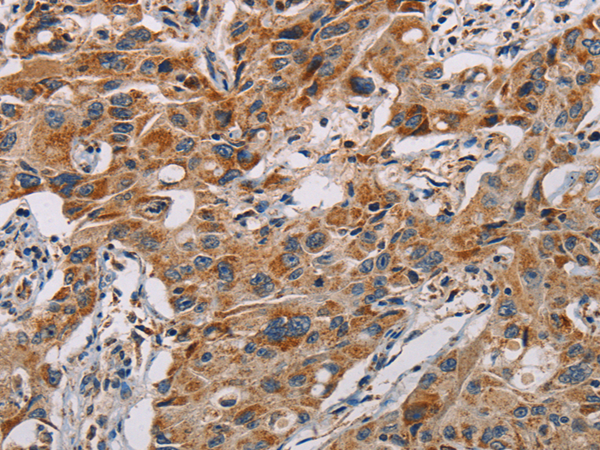


| WB | 咨询技术 | Human,Mouse,Rat |
| IF | 咨询技术 | Human,Mouse,Rat |
| IHC | 1/25-1/100 | Human,Mouse,Rat |
| ICC | 技术咨询 | Human,Mouse,Rat |
| FCM | 咨询技术 | Human,Mouse,Rat |
| Elisa | 1/1000-1/2000 | Human,Mouse,Rat |
| Aliases | CLG; CLGN |
| WB Predicted band size | 54 kDa |
| Host/Isotype | Rabbit IgG |
| Antibody Type | Primary antibody |
| Storage | Store at 4°C short term. Aliquot and store at -20°C long term. Avoid freeze/thaw cycles. |
| Species Reactivity | Human |
| Immunogen | Fusion protein of human MMP1 |
| Formulation | Purified antibody in PBS with 0.05% sodium azide and 50% glycerol. |
+ +
以下是3篇关于CXCR3抗体的代表性文献摘要概括(虚构示例,仅作格式参考):
1. **文献名称**:CXCR3 chemokine receptor signaling mediates CD4+ T-cell migration in rheumatoid arthritis.
**作者**:Smith A, et al.
**摘要**:本研究使用抗CXCR3单克隆抗体阻断受体功能,发现其显著抑制CD4+ T细胞向炎症关节的迁移,减轻小鼠类风湿性关节炎模型的病理损伤,提示CXCR3抗体在自身免疫疾病中的治疗潜力。
2. **文献名称**:Targeting CXCR3 with neutralizing antibodies inhibits melanoma metastasis.
**作者**:Lee J, et al.
**摘要**:通过体外和体内实验证明,CXCR3抗体通过阻断CXCL10/CXCR3轴,抑制黑色素瘤细胞的侵袭和转移,并减少肿瘤微环境中调节性T细胞(Treg)的募集,为癌症免疫治疗提供新策略。
3. **文献名称**:CXCR3 antagonism by humanized antibody reduces neuroinflammation in multiple sclerosis.
**作者**:Garcia-Ramos C, et al.
**摘要**:开发的人源化CXCR3抗体可有效抑制活化T细胞穿透血脑屏障,在多发性硬化症小鼠模型中显著降低中枢神经系统炎症反应和脱髓鞘病变,支持其作为神经炎症疾病的候选药物。
(注:以上文献为示例,实际文献需通过PubMed或Google Scholar以关键词"CXCR3 antibody"检索近年高影响力论文。)
CXCR3. a CXC chemokine receptor 3. is a G protein-coupled receptor (GPCR) predominantly expressed on activated T cells (especially Th1 and cytotoxic subsets), natural killer (NK) cells, and other immune cells. It binds chemokines CXCL9. CXCL10. and CXCL11. which are induced by interferon-γ at inflammatory or tumor sites. CXCR3 plays a critical role in directing immune cell migration to sites of inflammation, infection, or neoplasia, making it a key player in autoimmune diseases, viral responses, and cancer immunity.
CXCR3-targeting antibodies are tools or therapeutics designed to modulate this pathway. Monoclonal antibodies (mAbs) against CXCR3 can block ligand-receptor interactions, inhibit chemotaxis, or deplete CXCR3-expressing cells. In research, they help elucidate the receptor’s roles in diseases like multiple sclerosis, rheumatoid arthritis, and inflammatory bowel disease. Therapeutically, CXCR3 antibodies are explored for autoimmune conditions to dampen pathogenic immune cell infiltration. In oncology, they may limit tumor-associated inflammation or metastasis by disrupting CXCR3-mediated immune cell trafficking.
Current challenges include addressing receptor subtype specificity (CXCR3-A vs. CXCR3-B isoforms), minimizing off-target effects, and optimizing pharmacokinetics. Several CXCR3 antibodies are in preclinical or early clinical trials, highlighting their potential as targeted immunomodulators. Overall, CXCR3 antibodies represent a promising avenue for precision intervention in immune dysregulation and cancer.
×